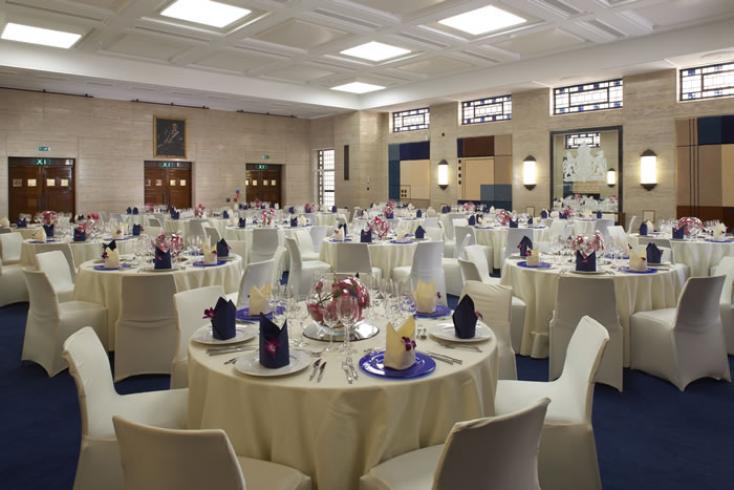 This year’s Bloomsbury Festival (15-20 October 2013) takes a look back and forward with the University of London’s Senate House as its focus. Built in the 1930s as the second tallest building in London (second only to St Paul’s Cathedral) Senate House soon became home to the newly established Ministry of Information at the outset of the Second World War.
This year’s Bloomsbury Festival (15-20 October 2013) takes a look back and forward with the University of London’s Senate House as its focus. Built in the 1930s as the second tallest building in London (second only to St Paul’s Cathedral) Senate House soon became home to the newly established Ministry of Information at the outset of the Second World War.
With kind permission of the Senate House Library we have been looking through some of the archives to find out a little bit more about what happened when the Ministry moved in and the academics moved out.
A message from the Minister of Information
Amongst the records of the Senate House committee is a letter dated 19 November 1940 from Lt. Col. N. G. Scorqie, secretary to the Minister of Information who at that time was Alfred Duff Cooper. The letter is directed to the Chairman and states that the minister wishes to:
“…convey to the University Staff his personal appreciation of all that they have done under the most difficult circumstances to make things as comfortable as they can for the Ministry.”
Scorqie goes on to recognise the difficulties that war brings leading to unreasonable demands:
“You might have had many departments who would have been easier guests for the University than this Ministry, and I am only too conscious that sometimes the exigencies of war make us rather unreasonable in our demands on your staff. If any echo of that has reached you it is pleasant to be able to set against it the minister’s own appreciation of what they have done for us.”
Provision of food at wartime Senate House
An example of these ‘exigencies of war’ can be found elsewhere in the Senate minutes. A report from the Maintenance Officer in regards to catering arrangements was presented to the meeting on 11 December 1940. The minutes record that the accounts were in deficit that year by £506. The reason was due to an ‘urgent’ request of the Ministry to annexe the Macmillan Hall for use as a bar and small restaurant for the Press. The Maintenance Officer noted that:
“The hot service, where the meals were prepared, was designed for the service of University banquets, with elaborate hot plates, tea boilers etc. Its running costs were consequently high, the electricity alone costing as much as 30s every 24 hours, and were not justified by the small number of meals served.”
Although the Press were likely enjoying the high-quality service this state of affairs couldn’t continue. The Maintenance Officer reported that service would cease in the Macmillan Hall and move to a new basement kitchen, cafeteria and Press Bar “which will be able to continue operation during air raids”. This was to be constructed by the Office of Works “at their own expense”. The Officer added:
“This new cafeteria should be very economical in operation, and it is anticipated that it will be a financial success. It is proposed in future only to serve luncheon in the Third Flour refectories. Breakfast, tea, and dinner will be provided in the Basement cafeteria, which will give an all-night refreshment service in addition.”
The plan appears to have been a success. Alfred Duff Cooper noted on 19 November 1940 that cooking facilities in the basement, along with living and sleeping conditions down there had “improved out of all recognition” all the more impressive as it had been achieved “within so short a period”. The Ministry was therefore pleased. The University also appears to have solved the money flow issues by the move. For the 1941 minutes the Maintenance Officer reported that the original deficit had been cleared:
“it is clear that the year should close with a substantial balance in hand, more than enough to cover the deficit incurred last year of £506”
There were many other issues to arise of course by this ‘occupation’ of University property, the most difficult of these was the question of the libraries. As this year’s Bloomsbury Festival confirms through the various events put on by the university library services, Senate House and the other Bloomsbury buildings contain fine, comprehensive collections very much worthwhile worrying about in a time of war. We will look closer at the fate of library books in a future post.
In the meantime check out our Festival Highlights post for details of events at this year’s Bloomsbury Festival.
The Bloomsbury Festival runs from October 15-20, 2013. The full schedule of events at the School of Advanced Study is available here. We are also running a series of exciting competitions in October. Follow us on @SASNews for festival news and updates.
Finding the Ministry of Communication:
Senate House, Malet Street, London

Trackbacks/Pingbacks